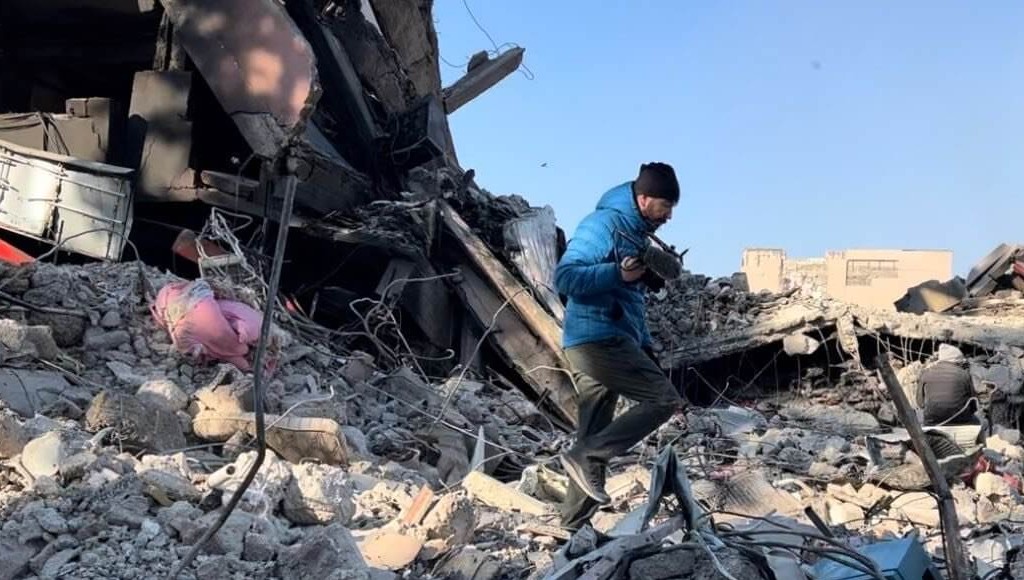The Paris-based Reporters without Borders (RSF) has said journalists trying to cover the situation on the ground in Turkey since a powerful earthquake struck on Feb. 6 face obstruction and harassment from authorities while doing their job and called on the authorities to respect journalists’ right to report the news.
A 7.8-magnitude earthquake that hit near the southeastern city of Gaziantep on the border with Syria has led to vast devastation across 10 provinces in Turkey as well as parts of Syria and had led to the death of more than 40,000 people in both countries as of Thursday, with the death toll in Turkey alone standing at more than 36,000.
RSF Turkey representative Erol Önderoğlu wrote in article published on the RSF website about press freedom violations suffered by the journalists in the earthquake zone.
“The press freedom violations monitored by RSF since the earthquake have included physical violence, arrests, judicial proceedings, online attacks and restrictions on access to Twitter. Journalists have been accused of ‘defaming the police or the state.’ Attempts to control the disaster narrative and coverage of the response by the authorities are becoming more and more visible,” he wrote.
The Turkish government and its leader, President Recep Tayyip Erdoğan, are criticized by earthquake survivors for not providing enough rescue workers and humanitarian aid in the first days after Turkey’s biggest disaster in nearly a century, leaving thousands of people trapped under the rubble.
Although Erdoğan admitted that there were shortcomings in the search and rescue efforts, pro-government TV stations are strictly limiting their content from the earthquake zone, giving more coverage to miracle rescues rather than the failure of the government’s disaster response.
When some independent journalists try to report on the true scale of the devastation and criticism from earthquake victims about the government, they face obstruction.
Önderoğlu said the Turkish authorities must not exploit the tragedy in Turkey to obstruct press freedom even more.
“The many restrictions, attacks, arrests and cases of intimidation of journalists are alarming and must stop at once. Reporters who have been sent to the devastated cities are just doing their job and are working in terrible circumstances. Their reporting is proving to be more essential than ever for everyone,” he wrote.
The RSF representative cited the individual cases of journalists who have been subjected to harassment from the police and judicial authorities in the quake zone such as the detention of Mahmut Altıntaş, a reporter for the pro-Kurdish Mezopotamya Agency (MA), Sema Çağlak, a reporter for JinNews and MA reporter Mehmet Güleş on what he said were “spurious grounds.”
Ferit Demir, a reporter for Halk TV, a station that’s critical of the government, said he was kicked repeatedly by a member of the counterterrorism police while covering the deployment of the government’s Disaster and Emergency Management Authority (AFAD) in the southeastern province of Malatya.
İrem Afşin, a journalist working for an international media outlet, said the Şanlıurfa police chief threatened her on Feb. 8, saying, “if you dare speak badly of our state, I will cut you off, I will throw you out of here and I will take care of you.” She said the police became more hostile after President Erdoğan declared a three-month state of emergency on Feb. 7 in the 10 provinces hit by the earthquake.
The restrictions on foreign media have also been tightened. The Presidential Department for Communication is imposing an accreditation procedure for international media outlets that want to go to quake-hit areas and talk to victims. Guillaume Perrier, a well-known reporter for the French Le Point weekly, was denied entry on Feb. 8, when he discovered that he had been banned from Turkey since November on the grounds that his reporting posed a ”threat to national security.”
Turkey, which is among the top jailers of journalists around the world, ranked 149th among 180 countries in the Reporters Without Borders (RSF) 2022 World Press Freedom Index.


